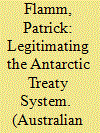| Srl | Item |
| 1 |
ID:
185842


|
|
|
|
|
| Summary/Abstract |
For six decades the Antarctic Treaty System (ATS) has succeeded in keeping the Antarctic continent free from military conflict while facilitating international scientific cooperation and environmental protection. As the international system undergoes profound changes once again today with the rise of Asia, a global resurgence of great power politics, an international pandemic, and an accelerating global climate crisis, it seems warranted to explore how this successful multilateral regime might be impacted. In the face of such systemic international challenges, what explains the continued success of the ATS? What does a future multipolar world order or a crisis of liberal democratic global order mean for this carefully balanced governance arrangement of one of the most fragile environmental systems on the planet?
|
|
|
|
|
|
|
|
|
|
|
|
|
|
|
|
| 2 |
ID:
185845


|
|
|
|
|
| Summary/Abstract |
Like other international institutions, the Antarctic Treaty System (ATS) relies on the goodwill and self-binding commitment of its members. Legitimacy, understood as the belief in the ‘rightfulness’ of a governing arrangement by its stakeholders, lies at the heart of the ATS’ success as a multilateral institution. Global warming and geopolitical power shifts are poised to challenge established forms of Antarctic legitimacy and effectiveness, with external calls for Antarctic democratisation and reform increasing. Using the concepts of input, output, and throughput legitimacy, this paper explores how the ATS has been legitimated as the only authoritative decision-making context for Antarctic matters, internally amongst Treaty Partners as well as externally towards the rest of the international community. It argues that the increase of input legitimacy through the inclusion of more consultative parties led to a perceived lack of output legitimacy for some especially environmental critics which illustrates the importance but also the limits of maintaining consensus about throughput legitimacy: the agreed upon processes and rules of decision-making. Finally, the analysis problematises the inhibiting centrality of nation states and the logic of sovereignty during times of global ecological and geopolitical change and asks how an ambitiously democratic future of Antarctic governance in the Anthropocene might look like.
|
|
|
|
|
|
|
|
|
|
|
|
|
|
|
|